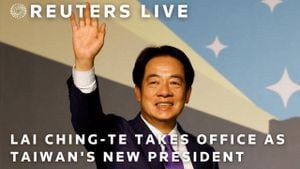Rachel Reeves, the UK Chancellor, faces mounting pressure to eliminate the proposed luxury car tax on electric vehicles (EVs) as concerns grow over the affordability of these vehicles. The new rules, implemented alongside plans to increase the number of EVs on the road, aim to support the government's net zero emissions objectives but are already creating controversy.
Under the new guidelines effective from April 1, 2025, EVs priced above £40,000 will incur what's known as the "expensive car supplement." This tax will impose an additional £425 per year for five years, adding up to more than £2,125 over the vehicle's lifespan.
Since 2020, zero-emission vehicles have enjoyed exemption from this tax, but the current Labour government is set to reinstate these levies as part of its fiscal strategy revealed in the latest Budget. The previous Conservative administration had initially laid the groundwork for this tax, which critics argue undermines efforts to promote electric vehicles.
The ramifications of this decision are significant. Research conducted by the Society of Motor Manufacturers and Traders (SMMT) indicates approximately 70% of new EVs will be subjected to this luxury tax compared to just 18% of petrol and diesel vehicles. Already, 300,000 electric motors were sold this year, and the ripple effects of such tax changes could deter future purchases.
Currently, electric vehicles are typically priced around one-third more than traditional combustion engines, which presents challenges for drivers aiming to transition to zero-emission options. The luxury car tax could narrow the gap even more, influencing consumer choice significantly.
The business secretary, Jonathan Reynolds, recently initiated a fast-track consultation on the proposed changes, emphasizing the need to reassess the impact these policies may have on the car industry. His call to action follows Stellantis, the parent company of Vauxhall, announcing the closure of its Luton van-making facility, which jeopardizes over 1,100 jobs. This news has raised alarms about the sustainability of the UK’s transition to electric vehicles.
Despite government aims to phase out petrol and diesel vehicles by 2030, auto industry leaders express skepticism. Stuart Masson, the editor of The Car Expert UK, warned, "Reeves' luxury car tax is not going to help the adoption of electric vehicles." He highlighted how the existing £40,000 threshold was set back in 2017 and has not been adjusted for inflation, proposing it should have risen above £50,000 to be reflective of the current market.
Quentin Willson, founder of the lobbying group FairCharge, echoed these concerns, arguing the tax contradicts efforts to incentivize broader adoption of EVs. "To democratize access to electric vehicles, lower-income drivers need support. Instead, this tax discourages change of behavior,' he said.
Factors contributing to this situation range from rising vehicle costs to the increasing complexity of EV ownership. Although manufacturers like Ford have actively lowered prices, the average cost of new electric vehicles remains higher than the luxury tax threshold. For example, the Tesla Model Y, currently the UK's most popular electric vehicle, starts at £44,990, thereby falling under the new tax.
Reactions from industry veterans paint a grim picture. Many believe the existing plans could introduce barriers just as the government is striving to boost the appeal of electric cars. The concerns span across vehicle taxes to broader economic incentives. Key players within the automotive industry, along with independent experts, argue the current tax policies need re-evaluation.
Reeves, who is under intense scrutiny from various stakeholders, continues to defend the government's fiscal strategy. Yet, the allegations leveled against her administration imply the effects could stall the UK’s ambitious EV plans. The upcoming consultation will play a pivotal role as officials weigh the delicate balance between revenue generation and promoting cleaner transport solutions.
The future of the electric vehicle market amid this turmoil is uncertain. With the specter of additional taxes looming, even seasoned car buyers might rethink their options rather than make the leap to zero-emission vehicles. Analysts express concern the decision might push many to stay with traditional vehicles, undermining the shift to greener options.
It remains to be seen how the government will navigate through this public outcry and industry pushback against the luxury car tax. The government's objective to propel electric vehicle adoption can either flourish or flounder depending on the policy strategies moving forward and their ability to engage the public effectively.



